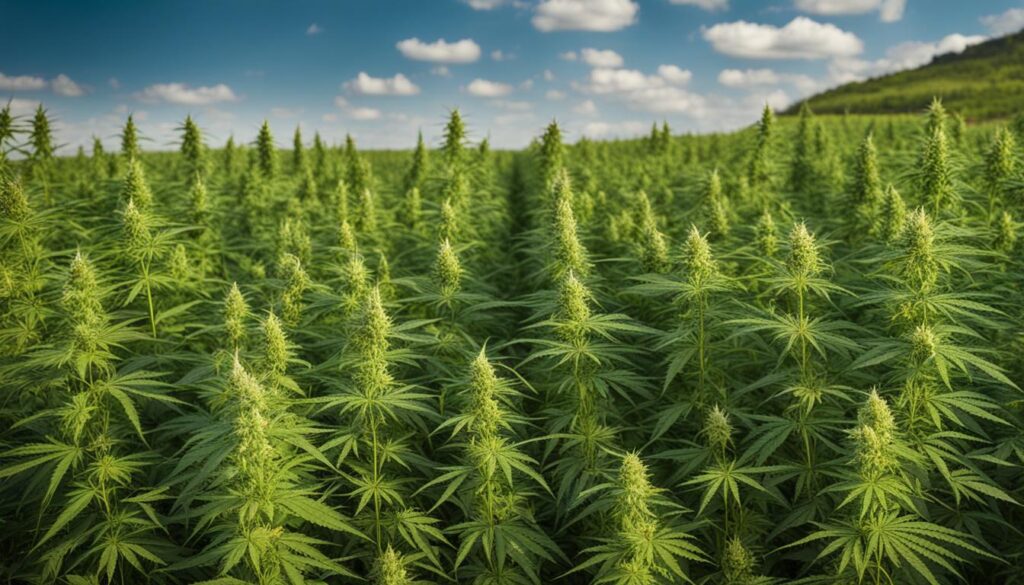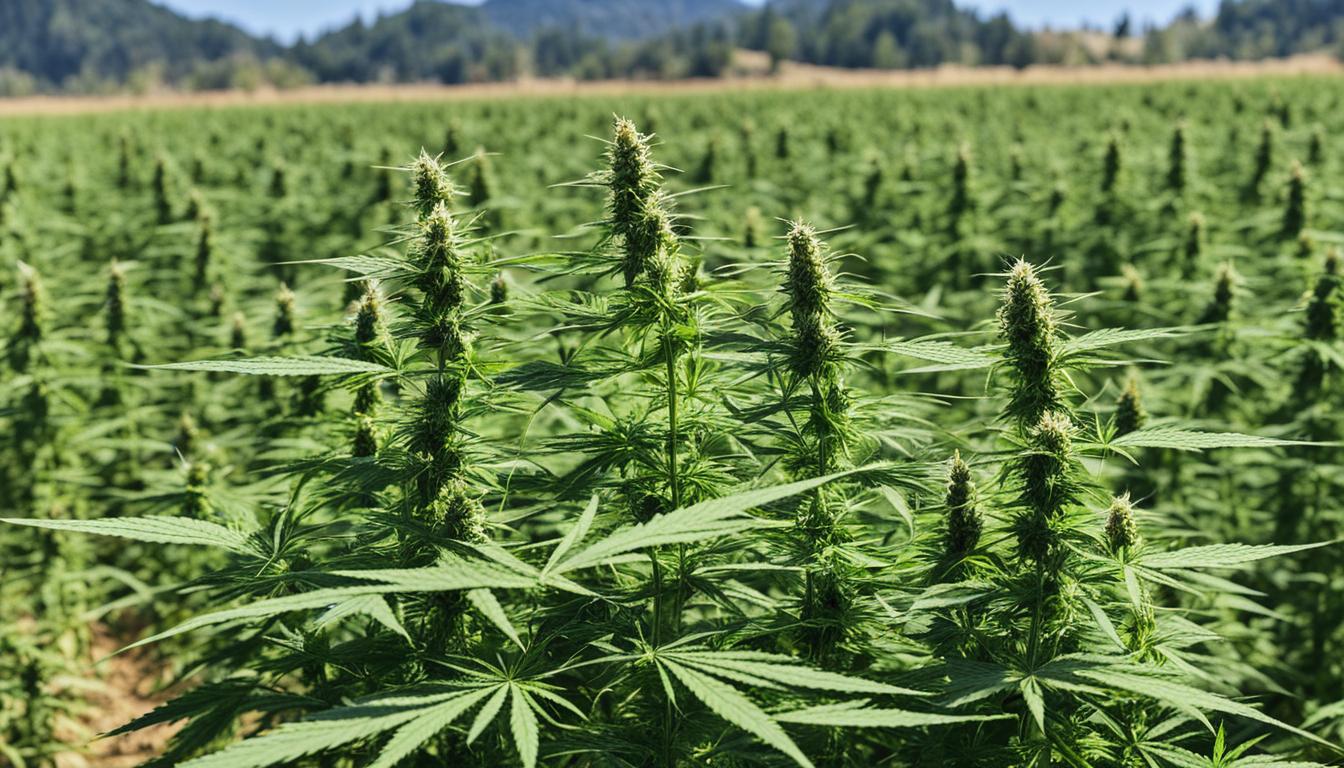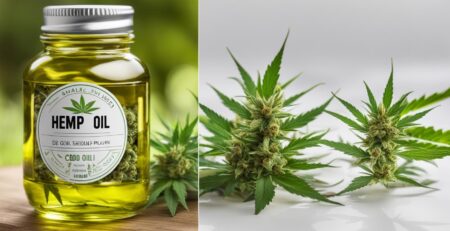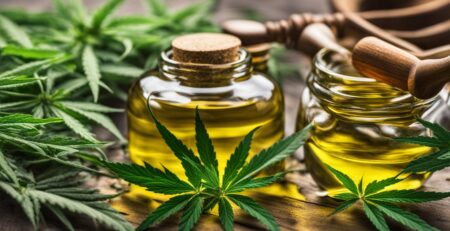Understanding & Setting Realistic Expectations for Hemp Products
Hemp products have gained popularity in recent years, with many people turning to them for various uses, including pain relief. However, it is important to set realistic expectations when using hemp products. The Oregon Liquor and Cannabis Commission has established cannabinoid limits for hemp products to ensure consumer safety. These limits ensure that hemp products do not exceed certain levels of THC, which is the psychoactive component of cannabis. It is important for consumers to understand these limits and the potential effects of hemp products to make informed choices.
Key Takeaways:
- Setting realistic expectations is crucial when using hemp products.
- The Oregon Liquor and Cannabis Commission has established cannabinoid limits to ensure consumer safety.
- Understanding the potential effects of hemp products is essential for informed decision-making.
- Consumers should be aware of the psychoactive component THC and its limits in hemp products.
- Setting realistic expectations helps prioritize safety and well-being.
The Rationale for Rulemaking for Hemp Products
When it comes to hemp products, understanding the rationale behind rulemaking is essential. In the state of Oregon, the Oregon Liquor and Cannabis Commission (OLCC) plays a crucial role in establishing regulations for hemp products. The rationale behind this rulemaking is to differentiate between industrial hemp commodities and adult-use cannabis items. By setting cannabinoid limits for hemp products, the OLCC aims to ensure consumer safety and protect minors.
The Oregon Legislature passed House Bill 3000 to address various issues related to cannabis, including the establishment of these cannabinoid limits. By implementing these limits, the OLCC can ensure that hemp products sold on the general market do not exceed certain levels of cannabinoids, including THC. This helps to maintain the distinction between hemp and cannabis products, promoting clarity and safety for both consumers and businesses.
With the rationale for rulemaking in place, consumers can have confidence in the safety and quality of hemp products available in the market. Additionally, businesses can ensure compliance with these regulations, promoting transparency and trust among their customers. By setting standardized limits and regulations, the OLCC is taking proactive measures to regulate the rapidly growing hemp industry and protect the well-being of consumers.
The Rationale for Rulemaking
“The rationale behind this rulemaking is to differentiate between industrial hemp commodities and adult-use cannabis items.”
Benefits of Rulemaking
- Promotes consumer safety by ensuring hemp products do not exceed certain cannabinoid limits
- Protects minors by setting regulations that help distinguish between hemp and cannabis products
- Provides clarity and transparency in the marketplace, allowing consumers to make informed choices
- Promotes compliance among businesses, fostering trust and confidence in the hemp industry
Current Regulatory Landscape for Hemp Products
The current regulatory landscape for hemp products is defined by the distinction between low-THC plants, known as hemp, and high-THC plants, commonly referred to as marijuana. Under federal law, hemp was removed from the schedule of controlled substances with the passage of the Agriculture Improvement Act of 2018. This legislation opened the door for the legal cultivation of industrial hemp and the production of hemp-derived products.
However, it is important to note that while federal law allows for the cultivation of hemp, the Food and Drug Administration (FDA) still maintains regulatory oversight of hemp-derived products, including CBD. The FDA has not yet established a clear regulatory framework for these products, resulting in a lack of consistent guidelines and standards across the industry.
At the state level, regulations for hemp products vary. Some states have implemented comprehensive regulations governing the cultivation, production, and sale of hemp products, while others have taken a more hands-off approach. These state-specific regulations can include licensing requirements, testing standards, and labeling requirements to ensure consumer safety and product quality.
| Low-THC Plants (Hemp) | High-THC Plants (Marijuana) |
|---|---|
| Contains less than 0.3% THC | Contains more than 0.3% THC |
| Legal at the federal level | Illegal at the federal level |
| Regulated under the Agriculture Improvement Act of 2018 | Regulated under the Controlled Substances Act |
In summary, the current regulatory landscape for hemp products is a patchwork of federal and state regulations. While hemp is legal at the federal level, the FDA's regulatory oversight and the varying state regulations add complexity to the industry. It is important for businesses and consumers to stay informed about the evolving regulations and work together to ensure compliance and consumer safety.
References:
- Food and Drug Administration (FDA): FDA Regulation of Cannabis and Cannabis-Derived Products
- Agriculture Improvement Act of 2018 (2018 Farm Bill): Full Text of the 2018 Farm Bill
The FDA’s Position on CBD and THC in Hemp Products
When it comes to the regulation of hemp products, the FDA has taken a clear stance on the inclusion of CBD and THC. The active ingredients in these products, CBD and THC, have been approved as drug ingredients in FDA-approved medications. As a result, the FDA considers the introduction of CBD or THC into the food supply or marketing them as dietary supplements to be illegal under the Federal Food, Drug, and Cosmetic Act (FD&C Act). This position is based on the belief that CBD and THC should be subject to the same rigorous testing and regulation as other pharmaceutical drugs.
However, it is important to note that there are exceptions to this position. The FDA has deemed certain hemp-derived ingredients, such as hemp seeds and hemp seed oil, to be safe for consumption. These ingredients can be used in food products and marketed as dietary supplements. It is crucial for businesses in the hemp industry to understand these exceptions and comply with FDA regulations to avoid legal complications.
It is worth mentioning that the FDA's position on CBD and THC in hemp products may evolve as further research and evidence become available. The agency has acknowledged the growing interest and potential health benefits associated with CBD and hemp-derived products. As a result, they are actively exploring regulatory pathways for these products, including potential updates to existing regulations. Businesses and consumers alike should stay informed about any changes and updates in FDA regulations to ensure compliance and make educated decisions.
Overall, the FDA's position on CBD and THC in hemp products is clear: they cannot be included in food or dietary supplements due to their status as FDA-approved drug ingredients. However, there are exceptions for certain hemp-derived ingredients that have been deemed safe. It is important for businesses in the hemp industry to navigate these regulations and compliance requirements to ensure the safety and legality of their products.
People’s Motivations for Using Hemp Products
When it comes to hemp products, people are motivated by various reasons and expectations. One of the main motivations is the perception that hemp products offer natural pain relief. Many individuals prefer using hemp products over conventional medications because they believe that these products are effective in managing their pain. In fact, hemp products have gained popularity as an alternative medicine option for those who have not found relief with traditional treatments.
The use of hemp products for pain management is supported by a growing body of anecdotal and scientific evidence. Many people have reported positive outcomes in terms of pain reduction, relaxation, improved sleep, and enhanced functionality after using hemp products. These benefits contribute to an overall sense of well-being. Notably, both human patients and pet owners have reported similar positive experiences with hemp products in managing chronic pain.

“I've been using hemp products for my chronic pain, and it has made a significant difference in my quality of life. It's a natural alternative to prescription pain medications, and I feel more in control of my pain management.” – Jane, hemp product user
Exploring Alternative Medicine
One of the motivations for using hemp products is the growing interest in alternative medicine. Many individuals are seeking alternative treatments that align with their holistic approach to health and well-being. Hemp products, with their natural origins and potential health benefits, fit into this alternative medicine framework. People are drawn to the idea of using plant-based products as a gentler and more natural way to support their health.
- Perception of naturalness and minimal side effects
- Alignment with holistic health and wellness practices
- Interest in exploring traditional remedies and plant-based therapies
Demand for Natural Pain Relief
Natural pain relief is a major driver of motivation for using hemp products. Many individuals are looking for alternatives to conventional pain medications, which can often have undesirable side effects or lead to dependence. Hemp products offer a potential solution by providing pain relief through a natural and non-addictive approach. The growing body of evidence supporting the efficacy of hemp products in pain management further fuels the demand for these natural alternatives.
- Desire to avoid or reduce reliance on prescription pain medications
- Search for non-addictive and safe pain relief options
- Interest in exploring natural remedies for chronic pain
Fulfillment of Expectations from Hemp Products
When it comes to using hemp products, many individuals have reported that their expectations have been fulfilled in terms of pain reduction, relaxation, improved sleep, and overall functionality. These products have been found to provide various benefits that contribute to a sense of well-being and improved quality of life.
One of the key benefits that hemp products offer is pain reduction. Many users have experienced relief from chronic pain, inflammation, and discomfort after incorporating these products into their daily routine. The natural properties of hemp, such as its anti-inflammatory and analgesic effects, make it a popular choice for those seeking alternative pain management options.
In addition to pain reduction, hemp products have also been associated with increased relaxation and improved sleep. People have reported feeling calmer, more relaxed, and better able to manage stress and anxiety after using hemp-derived products. The soothing properties of hemp can help individuals unwind and promote a sense of calmness, leading to better sleep quality and overall relaxation.
| Symptom/Expectation | Fulfillment |
|---|---|
| Pain Reduction | ✓ |
| Relaxation | ✓ |
| Improved Sleep | ✓ |
| Functionality | ✓ |
Many users have experienced relief from chronic pain, inflammation, and discomfort after incorporating hemp products into their daily routine.
Furthermore, hemp products have been found to enhance functionality and promote overall well-being. Users have reported increased energy levels, improved focus, and heightened cognitive function when using these products. This could be attributed to the balancing effects of hemp on the body's endocannabinoid system, which plays a crucial role in maintaining homeostasis and supporting optimal functioning.
It is important to note that individual experiences may vary, as everyone's body chemistry is unique. While hemp products have shown promise in fulfilling expectations related to pain reduction, relaxation, improved sleep, and functionality, it is essential to set realistic expectations and understand that results may differ from person to person.
State Patchwork of Laws for CBD Regulation
When it comes to the regulation of CBD products, there is a complex and ever-changing patchwork of laws that vary from state to state. Each state has its own set of regulations governing the manufacturing, sale, and marketing of CBD products, resulting in a fragmented regulatory landscape. This state-specific approach to CBD regulation can create challenges for businesses operating in multiple jurisdictions and can lead to confusion among consumers.
To ensure compliance with state-specific regulations, businesses selling CBD products must navigate a range of requirements. These may include obtaining licenses or permits, adhering to specific manufacturing standards, and meeting labeling and testing requirements. Failure to comply with these regulations can lead to penalties and other legal consequences.
“The state patchwork of laws for CBD regulation creates unique challenges for businesses operating in the hemp industry. As regulations continue to evolve, it is crucial for businesses to stay informed and adapt their practices accordingly.”
– CBD industry expert
Given the complexities of state-specific regulations, it is essential for businesses to stay up to date with the latest developments in CBD legislation. This includes monitoring changes at both the federal and state levels. Engaging legal counsel with expertise in CBD regulation can also be invaluable in navigating the intricacies of state-specific laws and ensuring compliance.
| State | Legal Status of CBD | Regulatory Requirements |
|---|---|---|
| California | Legal for both medical and recreational use | Strict labeling and testing requirements |
| Texas | Legal, but with restrictions | Licensing requirements for retailers |
| Florida | Legal for medical use | Registration requirements for dispensaries |
| New York | Legal for both medical and recreational use | Stringent quality control and testing standards |
As the CBD industry continues to grow, there is a growing demand for more consistent and standardized regulation at the federal level. This would provide clarity for businesses operating across state lines and promote consumer safety. Several bills are currently being considered by Congress that aim to address the regulatory gaps and establish a framework for federal CBD regulation.
In conclusion, the state patchwork of laws for CBD regulation presents both challenges and opportunities for businesses in the hemp industry. Navigating these diverse regulatory landscapes requires careful attention to state-specific requirements and a commitment to staying informed. By understanding and complying with state regulations, businesses can ensure the legal and compliant sale of CBD products while maintaining consumer trust and safety.
Trends in CBD Regulation for 2021
In 2021, there are several notable trends in CBD regulation that we need to pay attention to. With the growing demand for federal regulation in the CBD industry, Congress is currently considering two bills that could potentially bring about significant changes. These bills aim to allow CBD as an ingredient in dietary supplements and foods, filling the regulatory gap left by the FDA. If passed, they would provide clarity for businesses selling CBD products and ensure consumer safety.
Furthermore, major stakeholders, including investors and major retailers, are actively advocating for regulatory stability and compliance in the CBD market. The rapid expansion of the CBD industry has created a need for consistent regulations to ensure the quality and safety of products. Businesses in the CBD sector are eagerly awaiting federal regulations that will provide a clear framework for operations.
While federal regulation is a key focus, it's important to note that the regulatory landscape for CBD products remains a complex patchwork at the state level. Each state has its own set of regulations governing the manufacturing, sale, and marketing of CBD products. These regulations often include manufacturing standards, labeling requirements, and testing standards to ensure consumer safety. Businesses must navigate through these state-specific regulations to maintain compliance and avoid penalties.

Current Legislation:
- The bill to legalize CBD as an ingredient in dietary supplements and food products. If passed, this bill will fill the regulatory gap left by the FDA and provide clarity for businesses selling CBD products.
- The bill to establish federal regulations for the CBD industry. This bill aims to create uniform standards for manufacturing, labeling, and testing of CBD products, ensuring consumer safety and quality control.
- The bill to expand access to medical CBD. This bill would allow for increased access to CBD-based medications for individuals with qualifying medical conditions.
Impact on the CBD Industry:
- Increased regulatory clarity and stability, providing businesses with clear guidelines for manufacturing, labeling, and marketing CBD products.
- Improved consumer confidence, as federal regulations will ensure product quality, safety, and accurate labeling.
- Market growth and expansion, as regulatory stability attracts more investors and major retailers to the CBD industry.
| State | Current CBD Regulations |
|---|---|
| California | Allows the sale of CBD products derived from hemp, with certain labeling requirements and testing standards in place. |
| Texas | Permits the sale of CBD products, but with restrictions on THC content. Texas also requires product testing and proper labeling. |
| New York | Allows the sale of CBD-infused food and beverages, but requires products to meet certain quality standards and labeling requirements. |
“The CBD industry is at a critical juncture, and federal regulation will play a crucial role in its future growth and development.” – CBD industry expert
State Retailer and Transportation Registrations for Hemp Products
When it comes to selling hemp products, retailers must navigate a complex landscape of state regulations. A growing number of states now require retailers to register or obtain a handler's license to legally sell hemp products within their jurisdictions. These registration requirements apply to both brick-and-mortar stores and online retailers, although enforcement is often focused on physical locations. By complying with these regulations, retailers can ensure the legality of their operations and avoid penalties.
In addition to retailer registrations, states also have specific requirements for the transportation of hemp products. To maintain the legal transport of these goods, businesses must obtain transportation permits or use manifests to document the movement of hemp products. These measures help to ensure the proper handling and tracking of hemp products throughout the supply chain. It is essential for businesses involved in the transportation of hemp products to understand and comply with these state-specific regulations.
State Retailer Registration Requirements
The exact requirements for retailer registrations can vary from state to state, but they generally involve submitting an application form and paying any applicable fees. Some states may also require background checks or additional documentation, such as proof of compliance with federal and state laws. It is important for retailers to research and understand the specific requirements in their state to ensure full compliance.
Transportation Permits and Manifests
Transportation permits and manifests are crucial for ensuring the legal transport of hemp products. These documents serve as proof that the products being transported comply with state regulations. Businesses involved in the transportation of hemp products should work closely with their state's hemp regulatory agency to obtain the necessary permits and understand the specific requirements for generating manifests.
By adhering to state retailer registration requirements and transportation regulations, businesses can operate legally and confidently in the hemp industry. It is important to stay up to date with any changes or updates to these regulations, as they can evolve over time. Working with legal counsel and staying informed about state-specific regulations will help businesses navigate the complexities of selling and transporting hemp products while ensuring compliance with the law.
Compliance with Federal and State Laws for Hemp Products
In the rapidly evolving hemp industry, businesses must prioritize compliance with both federal and state laws. This ensures the legality of their operations and maintains consumer safety. The marketing, labeling, and safety standards of hemp products should align with the regulations set forth by relevant authorities. Staying up to date with changing regulations and working with legal counsel is essential to navigate the complex landscape of the hemp industry.
Federal laws, such as the Federal Food, Drug, and Cosmetic Act (FD&C Act), shape the regulation of hemp products. The FDA's current position on CBD and THC in hemp products prohibits their inclusion in food or dietary supplements. However, exceptions are made for certain hemp-derived ingredients, such as hemp seeds and hemp seed oil.
“The FDA considers the introduction of CBD or THC into the food supply or marketing them as dietary supplements to be illegal under the FD&C Act.”
In addition to federal regulations, businesses must also comply with state laws. Each state has its own requirements governing the manufacturing, sale, and marketing of hemp products. This includes obtaining a handler's license or retailer registration to legally sell hemp products within the state. States may also require transportation permits to ensure the lawful transport of these products.
Labeling Requirements
Labeling plays a crucial role in compliance with federal and state laws for hemp products. Clear and accurate labeling helps consumers make informed choices and prevents misleading claims. Labeling requirements may include providing information about the CBD or THC content, serving size, recommended dosage, and potential side effects. Additionally, labels should adhere to any state-specific requirements, such as warnings or disclaimers.
| Labeling Requirements for Hemp Products | Federal | State |
|---|---|---|
| Clear identification of CBD or THC content | Required | Varies |
| Accurate serving size and recommended dosage | Recommended | Varies |
| Potential side effects or warnings | Recommended | Varies |
| State-specific requirements | N/A | Varies |
Complying with both federal and state laws is essential for businesses selling hemp products. By ensuring compliance with regulations and meeting labeling requirements, businesses can navigate the complex legal landscape and contribute to the overall safety and wellbeing of consumers.
Conclusion
In conclusion, it is crucial for both consumers and businesses in the hemp industry to set realistic expectations for hemp products. By understanding the regulatory landscape and limitations of these products, individuals can make informed choices and ensure their safety. It is important to consult healthcare professionals and legal experts to navigate the complex regulations governing hemp products and maintain compliance with federal and state laws.
By setting realistic expectations and staying informed, individuals can make the most of the potential benefits offered by hemp products while prioritizing their well-being. It is important to note that individual experiences may vary, and what works for one person may not work for another. However, many people have reported that hemp products fulfill their expectations in terms of pain management, relaxation, improved sleep, and overall functionality.
While the CBD industry continues to evolve and regulations are constantly changing, businesses must ensure compliance with federal and state laws. This includes marketing products lawfully, adhering to labeling requirements, and meeting safety and efficacy standards. Staying up to date with changing regulations and working with legal counsel is essential for businesses in the rapidly growing hemp industry.
FAQ
What are some realistic expectations for hemp products?
Hemp products can provide pain relief, relaxation, improved sleep, and overall well-being. However, individual experiences may vary, so it's important to set realistic expectations and understand the potential limitations of hemp products.
What are the cannabinoid limits for hemp products?
The Oregon Liquor and Cannabis Commission has established cannabinoid limits for hemp products to ensure consumer safety. These limits ensure that hemp products do not exceed certain levels of THC, the psychoactive component of cannabis.
How is the regulation of hemp products different from marijuana?
Under federal law, hemp is distinguished from high-THC plants, commonly known as marijuana. Hemp is now legal to cultivate and use for various purposes, while marijuana remains a controlled substance. However, the FDA still maintains regulatory oversight of hemp-derived products and has not established clear guidelines for their use.
What is the FDA’s position on CBD and THC in hemp products?
The FDA considers it illegal to include CBD and THC in food or dietary supplements, as they are approved as drug ingredients in FDA-approved medications. However, there are exceptions for certain hemp-derived ingredients, such as hemp seeds and hemp seed oil, which the FDA has deemed safe.
Why do people use hemp products?
People use hemp products for various reasons, including natural pain relief and as an alternative medicine option. There is a growing body of anecdotal and scientific evidence supporting the use of hemp products for pain management and overall well-being.
Do hemp products fulfill expectations for pain management?
Many people report that hemp products have fulfilled their expectations for pain management, including reducing pain, increasing relaxation, improving sleep, and enhancing functionality. However, it's important to set realistic expectations and understand that individual experiences may vary.
What are the state-specific regulations for CBD products?
Each state has its own regulations governing the manufacture, sale, and marketing of CBD products. These regulations often include manufacturing standards, labeling requirements, and testing standards to ensure consumer safety.
What are the trends in CBD regulation for 2021?
Congress is considering bills that could allow CBD as an ingredient in dietary supplements and foods, aiming to fill the regulatory gap left by the FDA. There is also a growing demand for federal regulation to provide stability and compliance in the rapidly expanding CBD industry.
What registrations are required for retailers of hemp products?
A growing number of states require retailers of hemp products to register or obtain a handler's license to legally sell these products within the state. States also require transportation permits or manifests to ensure the legal transport of hemp products.
How can businesses ensure compliance with federal and state laws for hemp products?
Businesses selling hemp products must comply with both federal and state laws, including lawful marketing, labeling requirements, and safety standards. Staying informed about changing regulations and working with legal counsel is crucial in the rapidly evolving hemp industry.
What is the importance of setting realistic expectations for hemp products?
Setting realistic expectations helps individuals make informed choices, understand the potential benefits and limitations of hemp products, and prioritize safety and well-being. Consulting healthcare professionals and legal experts can provide guidance in navigating the complex regulations governing hemp products.
Source Links
- https://www.ncbi.nlm.nih.gov/pmc/articles/PMC7819300/
- https://www.oregon.gov/olcc/Docs/commission_minutes/2021/Considerations-In-Establishing-Cannabinoid-Limits-Hemp-Whitepaper.pdf
- https://www.bigcommerce.com/articles/selling-cbd-online/cbd-legal-trends/











Leave a Reply